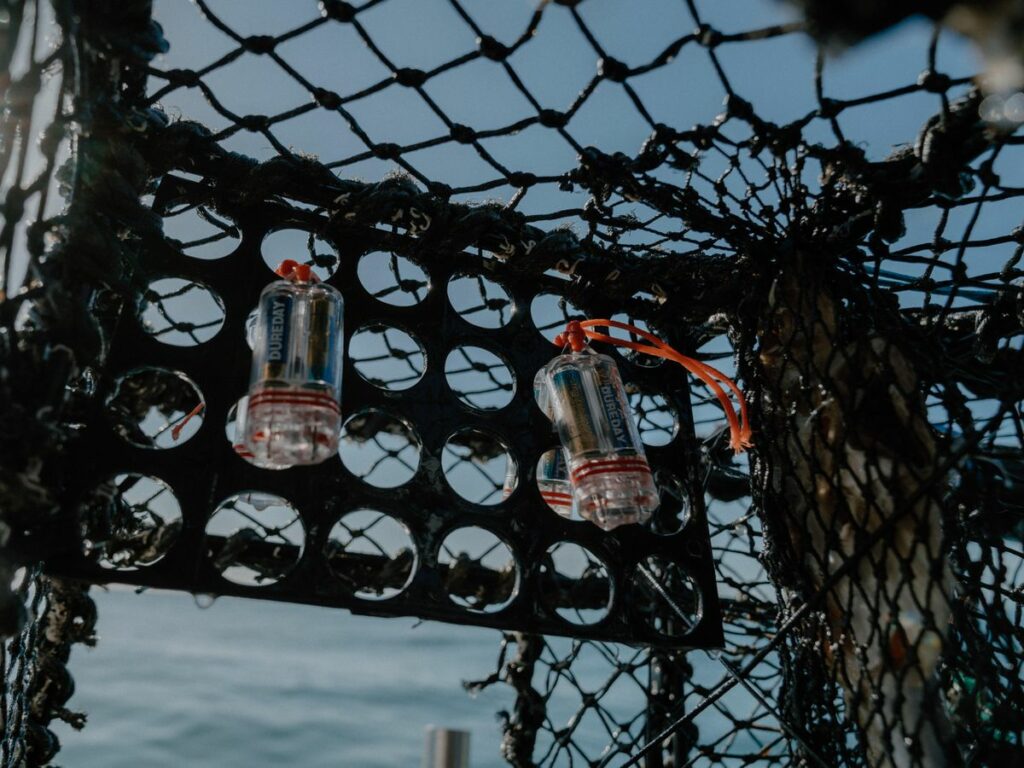

Funding from the Company’s Fisheries Charitable Trust has supported ground-breaking research into the effectiveness of LED lights on attracting scallops in inshore fisheries. The results could support the development of a new, low-impact scallop fishery for the UK’s inshore fishing fleets.

In 2019 Dr Rob Enever and his team from Fishtek Marine were tinkering with adding small LED lights to traditional crustacean pots. These lights, they hoped, would attract crabs and lobsters to the pots, without the need to use fish as bait. The lights were simply named ‘PotLights’, and the modified traps were handed over to Newlyn fisherman John Ashworth for trial on fishing grounds off the Cornish coast. Strings shot, they waited….
When they hauled the pots a few days later, they found they had accidentally attracted a rather unexpected reveller: king scallops. A number of scallops were in the pots, alongside the expected species of crustacean.
With over 200 eyes, for some time it’s been no secret that scallops are sensitive to light, but it was previously unknown that they could be attracted to it in this way. Speaking to The Guardian, Ashworth stated that “pretty much every pot (with lights) hauled had scallops in them, and yet every pot without lights had no scallops”. John, skipper of the Three Jays, also revealed that from the 35,000 pots he hauls annually, he would generally not expect to see more than five scallops all year. When he began shooting pots with PotLights, the first haul immediately revealed 15 scallops.
This caused so much excitement that Dr Enever, lead author of the study, “could hardly sleep for a couple of nights”. This had potential to be a worldfirst discovery, but further research was needed. Funding was granted from the Company’s Fisheries Charitable Trust, alongside support from the UK Seafood Innovation Fund, which is part of the £100m UK Seafood Fund. Researchers from the University of York and Exeter got on board, as well as more local fishermen and pot makers.
With this additional support, Fishtek Marine began conducting further trials to investigate the phenomenon. The trials were again conducted in Cornish waters, on grounds traditionally potted for crustaceans. Between December 2020 and February 2021, 77 strings were shot, deploying 1,886 pots of several different designs. Some pots included modifications such as ramps and retainers to help scallops enter pots and make leaving them more difficult.

The results? Scallops are party animals!
All treatments with lights were found to retain scallops, and of 518 total scallops recorded, 516 (99.6%) were caught in pots with lights. Modified parlour pots containing PotLights were most effective, with 24 scallops caught in a single pot!
The full results of the research can be found here.
Fittingly, these LED-modified pots are now being referred to as ‘scallop discos’. Not only do these pots particularly attract scallops, they also had no detrimental effect on catches of crab and lobster: scallops were simply being caught alongside them. These exciting findings have introduced the potential for a new, low-impact and low-cost alternative to traditional scallop fishing methods. Currently, scallops are caught primarily using dredges, which, due to their heavy and penetrative design, carry a high impact on the seabed.
The other low-impact alternative currently practised is hand-gathering by divers, but this method can only produce limited quantities. PotLights – small, AA-battery powered LED lights – are an inexpensive, reusable modification for crustacean pots. Further experiments will look to refine pot designs and LED lights to specifically retain attracted scallops, and also investigate the effect of using different light colours.
As of June 2022, Orkney, the Isle of Man and Dartmouth have been identified as further sites to trial PotLights. For now, the research has shown that PotLights work, and could offer a potential to boost inshore fisheries with further development.
This article is adapted from Ain’t No Party Like a Scallop Party – Caitlin Turner, Seafish, Quay Issues, Volume 9 2023